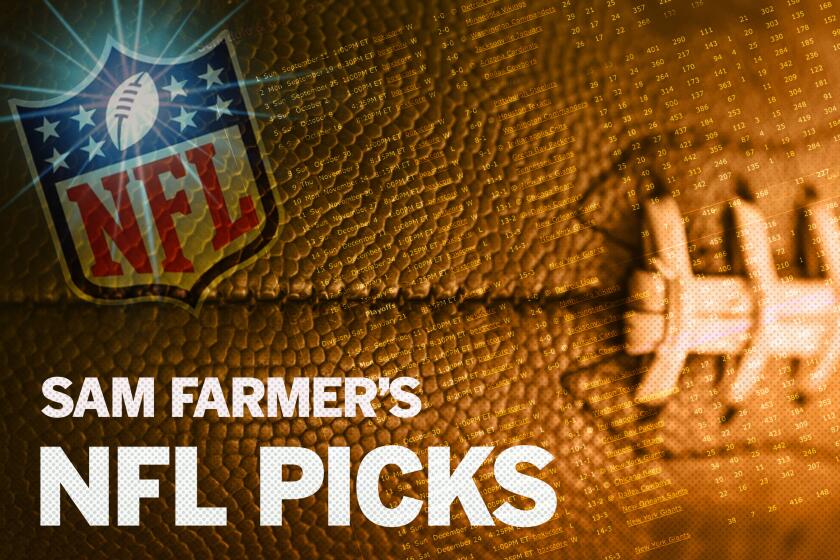PROFILE : Racing Fever : Ojai’s Greg McNeil, one of the country’s top amateur cyclists, is gearing toward upcoming road race championships.
Cycling is a sport that attracts dreamers. Remember Dennis Christopher pretending to be an Italian racer in the movie “Breaking Away”? Or how about Pee Wee Herman fantasizing of winning the Tour de France in “Pee Wee’s Big Adventure”?
Ojai’s Greg McNeil has reason to dream big. He is one of America’s top amateur cyclists, and he is preparing for Saturday and Sunday’s U.S. Amateur Cycling Road Race Championships in Salt Lake City. McNeil’s dreams seem to have bumped into reality.
McNeil has been a member of the U.S. National Cycling Team both as a junior and a senior rider. At age 17, he was ranked as the top junior rider in the country and he has continued to progress as a senior amateur. He is now one of seven members of the U.S. Roadracing team.
Having traveled the globe as a cyclist, McNeil has seen the sport at its best and its worst. He has suffered a number of serious crashes and has broken his collarbone four times.
Rocks, he said, were hurled at him by a group of Arabs expressing anti-American sentiment at the Junior World Championships in Morroco in 1987. And, he said, he has seen many of his competitors using drugs.
“I’ve seen guys inject themselves during races,” McNeil said. “They will just pull out a syringe and stick it in their leg while they are racing and then throw it away when they’re through.”
McNeil said he has always raced drug-free. “I decided a long time ago that I won’t do drugs.” But heading into the nationals, he is saddled with a major problem of his own--a virus he picked up as a souvenir on his last tour of Europe.
He came down with the illness after a pair of fifth-place finishes in Germany. He attempted to compete in the 14-day event in England, but was forced to drop out after four days.
“Things were going really well for me,” McNeil said. “But whatever I got in Germany, I never have gotten rid of.”
The illness has disrupted McNeil’s training regimen since he has been back in Ojai. “I’ll feel like I’m getting better, then I train hard one day and it will hit me again.”
McNeil, who studies engineering at Cal Poly-San Luis Obispo when not cycling, has wanted to be a competitor since his first big race.
“What started him is we went on a hundred-miler,” said his father John McNeil, an Ojai dentist. “He got beat so bad.”
Losing, John McNeil said, made Greg want to compete again and win. That and the fact that Greg is the youngest of five children.
“He never got any respect,” John McNeil said.
A healthier McNeil got plenty of respect earlier this season, winning a pair of races on successive weekends in April. One was in Laguna Seca and the other, the Peter Jensen Memorial, was in Camarillo. But the 23-year-old is uncertain how his lack of training will affect him at the grueling nationals.
“I hope to do well. I’m not worried about it. There is nothing I can do about it now.”
A good showing at the nationals would increase McNeil’s marketability should he decide to turn pro after the 1991 amateur season. A poor showing, on the heels of an injury-plagued 1990 campaign, could hurt his chances at nabbing a pro sponsor.
McNeil has already had some sponsorship woes this year. First, Subaru-Montgomery, his 1990 team, and the top amateur team last year, decided to field only a professional team.
Then another sponsorship deal fell through, leaving McNeil to scramble for a team spot.
He eventually landed with Trek Cytomax, a team sponsored by a bicycle company and a mineral drink mix. Trek Cytomax has been among the top teams competing this year, but lacks the budget that McNeil’s other teams have had in the past.
“Pretty much everybody is in the same boat,” McNeil said. “There just isn’t that much sponsorship out there.”
With 1992 being an Olympic year, McNeil said he is hopeful that more corporate money will pour into cycling. But he is still not sure whether to stay an amateur and try to make the U.S. Olympic Team, or to turn pro and reap the financial rewards of an expanding economy in pro cycling.
“I would give (amateur cycling) another year, if I could live on it,” said McNeil, who as an amateur is allowed to earn up to $2,000 a day for expenses and still maintain amateur status. That money is funneled through the U.S. Cycling Federation to the rider’s team. The money is then distributed evenly to the team members.
“I’m one of 10 or 12 (racers) who can be one of the three (who make the Olympic Road Racing Cycling Team). I have a good chance, it’s just a matter of if I want to put in all of the effort.”
But there is also the fear of another injury, or illness getting in the way of a pro career.
“You can wait for the next year, but if you fall down and break something . . . “ McNeil said, his voice trailing off.
“This year, I’ve banked on my name and not my results. If you have a couple of bad years in a row, people forget you.”
And that is something that McNeil definitely doesn’t want to dream about.
More to Read
Go beyond the scoreboard
Get the latest on L.A.'s teams in the daily Sports Report newsletter.
You may occasionally receive promotional content from the Los Angeles Times.










